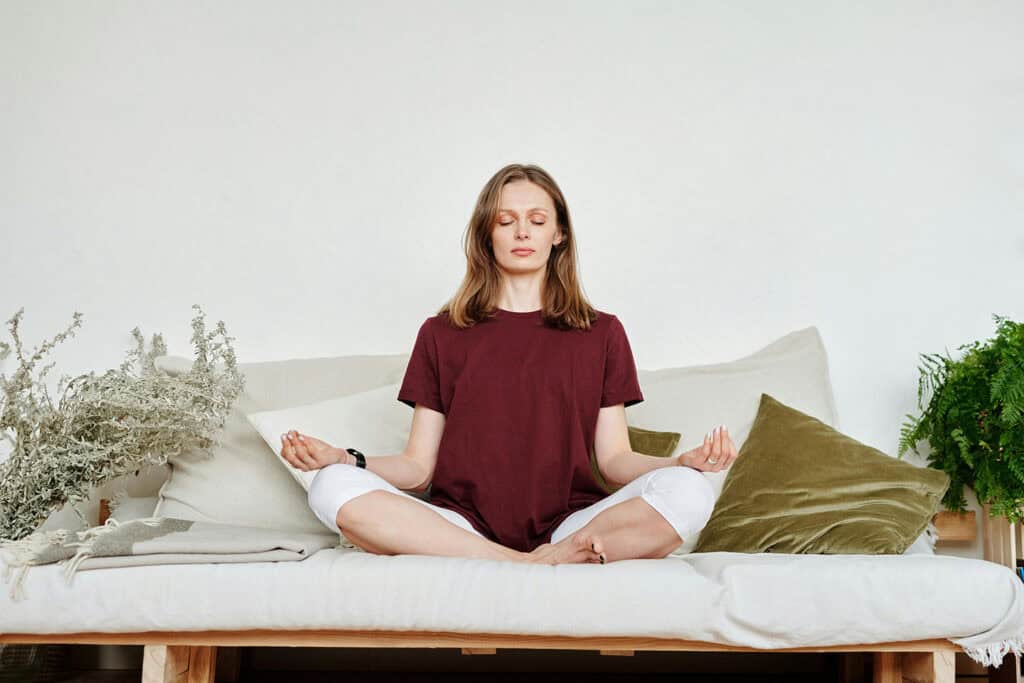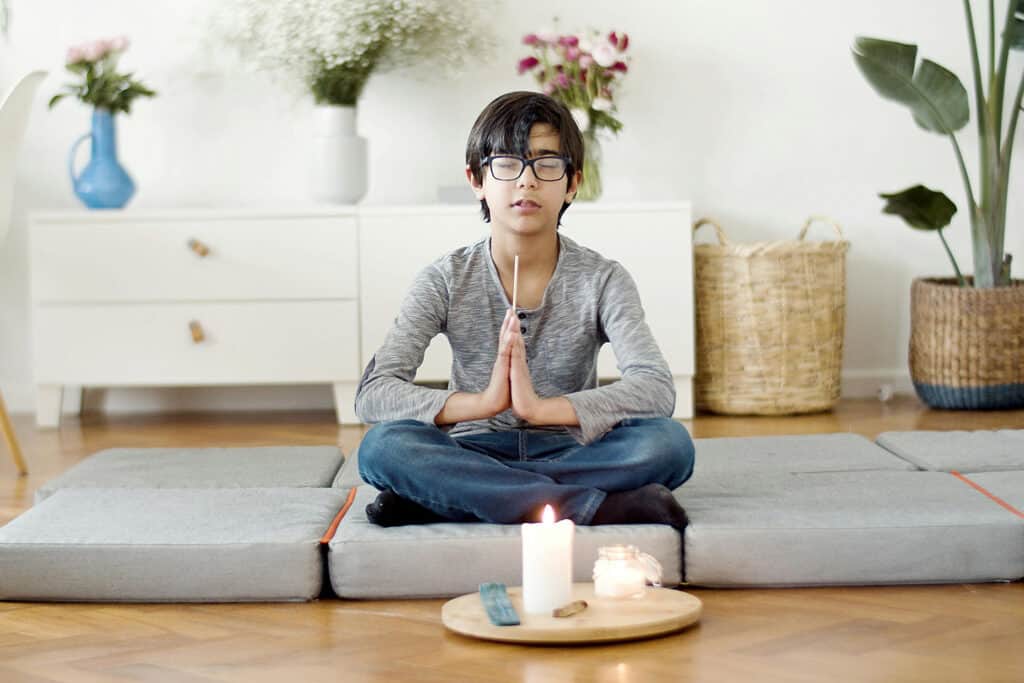Do you ever wonder if you should meditate in the morning or at night to get the most out of your practice? You’re not alone—many people struggle to build a consistent routine that truly supports their mental health, inner peace, and overall wellness.
If you’ve tried to start a meditation practice but felt unsure when to do it, this guide is for you. With experience helping others create mindful habits, we’ll walk you through the pros of both morning meditation and evening sessions.
In this article, we explore whether it’s better to meditate in the morning or at night by examining 6 key areas.
Here’s what you’ll discover:
- How to boost focus and clarity with a morning routine
- How to use guided meditation to reduce stress and sleep better
- Which time supports lower blood pressure and emotional balance
Keep reading to find out which time of day aligns best with your goals—and start feeling the difference in your body and mind today.
- 1. Benefits of Morning Meditation
- 2. Benefits of Night Meditation
- 3. Comparing Morning vs. Night Meditation
- 4. What Does Science Say About Meditating in the Morning or at Night?
- 5. Which Is Right for You?
- 6. Tips to Build a Consistent Meditation Habit
- Is It Better to Meditate in the Morning or at Night? Final Thoughts

1. Benefits of Morning Meditation

Morning meditation helps set the tone for your entire day. It’s peaceful, quiet, and perfect for building a daily habit. Meditating in the morning improves your mood, helps with clarity, and prepares your mind before the day starts.
It also reduces anxiety and stress before they even begin, making your reactions calmer and more thoughtful. You are less distracted in the morning, which helps you stay more focused during your session.
Why Morning Might Be Best:
- Your mind is fresh and free from the day’s stress.
- It’s easier to build a habit by attaching it to your morning routine.
- Fewer interruptions mean better concentration.
- It boosts your motivation and mindset early on.
- Natural light in the morning helps regulate sleep-wake cycles.
- You carry the calm into the rest of your day.
Even 10 minutes of quiet breathing each morning can transform how you handle challenges and emotions later on.
See also Shower Meditation
2. Benefits of Night Meditation

Meditating at night helps your body wind down and your mind release the stress collected throughout the day. It can improve sleep quality, reduce racing thoughts, and help you shift into a state of deep relaxation.
Nighttime deep meditation also helps process your emotions, allowing for reflection and emotional healing before sleep. It’s a peaceful way to end your day and let go of anything that may feel heavy or unsettling.
Why Night Might Be Best:
- Helps you sleep better by calming your thoughts.
- Releases stress and tension built up during the day.
- Allows quiet reflection on what happened throughout the day.
- You’re more in tune with how you actually feel.
- Creates a consistent bedtime routine.
- Can improve dreams and reduce insomnia.
Try guided meditations or calming music to support your practice if you’re mentally tired in the evening.
3. Comparing Morning vs. Night Meditation

Let’s take a deeper look at how these two times compare in real-life situations. Each offers something different.
| Feature | Morning Meditation | Night Meditation |
|---|---|---|
| Energy Level | Higher, more alert | Lower, more relaxed |
| Distraction Level | Lower, fewer interruptions | May be tired or distracted |
| Focus | Stronger mental clarity | Reflective and emotional clarity |
| Goal | Energize and set the day’s tone | Relax and prepare for restful sleep |
| Habit Formation | Easier to make part of a routine | Also effective with consistent practice |
Choosing the right time often comes down to when you feel most connected and consistent in your meditation practice.
See also Meditation Tools
4. What Does Science Say About Meditating in the Morning or at Night?

Scientific research highlights benefits for both morning and evening meditation, depending on individual goals and physiological patterns. Studies suggest morning meditation may improve attention, mood, and cortisol regulation.
A 2018 study published in Frontiers in Psychology found that morning mindfulness can enhance emotional control and cognitive performance throughout the day. On the other hand, nighttime meditation is linked to improved sleep quality and reduced insomnia.
A 2015 study in JAMA Internal Medicine reported that mindfulness meditation helps reduce sleep disturbances and stress levels. While morning sessions support focus and alertness, evening practice encourages relaxation and better rest.
Overall, studies support meditating at either time—depending on whether your goal is daily performance or restful sleep.
5. Which Is Right for You?

Your best time to meditate depends on your lifestyle, energy, and personal needs. There’s no one-size-fits-all answer. Some people meditate both in the morning and at night for different reasons. This brings a full-circle sense of balance.
Think about what you’re trying to get from meditation. Is it focus, emotional healing, or better sleep? Try both times for one week each. Reflect on how your mood, energy, and thoughts respond to each experience.
Questions to Ask Yourself:
- Am I more clear-headed in the morning or night?
- Do I want to energize or relax through meditation?
- When do I have fewer distractions or obligations?
- What helps me build a consistent habit?
- Do I feel rushed or calm during either time?
Journaling your meditation results can help you notice patterns and decide what works best for your body and mind.
6. Tips to Build a Consistent Meditation Habit

Whether you meditate in the morning or night, consistency matters most. A regular meditation for focus and energy brings the deepest benefits over time.
Helpful Tips:
- Set a reminder or alarm to begin at the same time each day.
- Create a calm space with low light and no distractions.
- Use an app or timer to stay focused and not worry about the clock.
- Try simple breathing or body-scan techniques if you’re just starting.
- Start small — even five minutes makes a difference when done regularly.
- Reward yourself after meditating to build a positive habit loop.
It doesn’t have to be perfect. What matters is showing up, sitting down, and breathing.
See also Yoga Meditation for Beginners
Is It Better to Meditate in the Morning or at Night? Final Thoughts
So, is it better to meditate in the morning or at night? The answer depends on your life and what you need most. If you want clarity, focus, and calm energy, mornings might be your best option. Start the day on a peaceful note.
If you’re looking to relax, reflect, and sleep better, nighttime meditation can work wonders. Both choices are valuable. What matters most is finding a routine you enjoy and can stick with consistently.
You can even blend both! A short morning session for focus, and a calming night practice for reflection and rest. Start today—pick a time, keep it simple, and breathe. Your mind and body will thank you.


